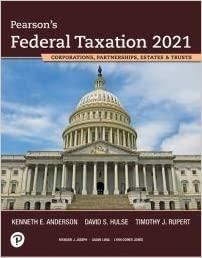Assume the same facts as in Problem C:13-48 and that before Yujis death in 2020 his wife
Question:
Assume the same facts as in Problem C:13-48 and that before Yuji’s death in 2020 his wife already owned property valued at $300,000. Assume that each asset owned by each spouse increased 8% in value by the surviving spouse’s date of death later in 2020, that Yuji’s executor elected to claim the maximum marital deduction possible, and that state death taxes are not an issue. From a tax standpoint, was the executor’s strategy of electing the marital deduction on the QTIP trust a wise decision? Support your answer with computations.
Data from C:13-48:
Assume the same facts as in Problem C:13-47 except that Yuji’s will also provided for setting up a trust to be funded with $400,000 of property with a bank named as trustee. His wife is to receive all the trust income semiannually for life, and upon her death the trust assets are to be distributed equally among Yuji’s children and grandchildren.
Data from C:13-47:
When Yuji died in March 2020, his gross estate was valued at $15 million. He owed debts totaling $300,000. Funeral and administration expenses were $12,000 and $120,000, respectively. Yuji willed his church $800,000 and his spouse $1.1 million. The marginal estate tax rate exceeded his estate’s marginal income tax rate. Calculate Yuji’s taxable estate.
Step by Step Answer:

Federal Taxation 2021 Corporations, Partnerships, Estates & Trusts
ISBN: 9780135919460
34th Edition
Authors: Timothy J. Rupert, Kenneth E. Anderson, David S. Hulse





